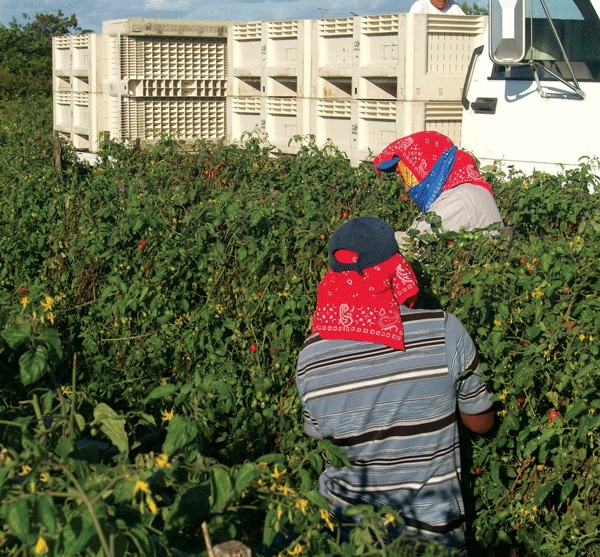
• “Estimates vary, but you see consistently that well over half — even upwards of three-quarters — of the folks who work in the fields in the produce industry haven’t been born in this country. So, certainly, anything related to immigration policy is of great interest to our industry.”

Now that the U.S. Supreme Court has dealt with Arizona’s controversial immigration law, what will happen in states with similar laws? What will be the impact on produce operations that rely on migrant work crews?
While striking down three provisions in the Arizona law — all immigrants must obtain or carry immigration registration papers; law enforcement can arrest suspected undocumented workers without a warrant; it is a crime for the undocumented to seek, or hold, a job — the Supreme Court kept in place the ability of police to check the immigration status of those they believe could be in the country illegally.
(See more here: southeastfarmpress.com/blog/more-confusion-clarification-supreme-court-s-immigration-ruling).
“For United Fresh and the produce industry, immigration and related issues have been a long-time concern and interest,” says Julie Maines of the United Fresh Produce Association.
“Estimates vary, but you see consistently that well over half — even upwards of three-quarters — of the folks who work in the fields in the produce industry haven’t been born in this country. So, certainly, anything related to immigration policy is of great interest to our industry.”
Mass deportations not feasible
Shortly after the ruling, Agriculture Secretary Tom Vilsack told a North Carolina audience that mass deportations aren’t feasible. To solve the problem of illegal aliens, Vilsack advocates “securing the border, having immigrants pay taxes, learn English, and gain the ability to work with a permit.”
Charles Hall, executive directorof the Georgia Fruit and Vegetable Growers Association, simply wants a worker program that works.
Having seen the fallout from Arizona-style laws targeting illegal workers in his home state — which included produce left to rot in the field last summer due to a lack of work crews to harvest it — Hall also tells a cautionary tale for other states considering such legislation. Among his comments:
How the Georgia legislation came about…
“We have a Republican state House, Senate and governor. There were concerns that the ‘undocumented’ workers in Georgia were costing municipalities, school systems, hospitals and taxpayers excessive amounts of money. And the undocumented workers were taking jobs away from citizens. That was the basis of why the legislation was introduced.
“It passed in the 2011 general assembly — which started in January and eventually adjourned in early April. We have a winter/spring general assembly that can’t meet for more than 40 days.
“The legislation was signed May 13, 2011, to go into effect July 1, 2011.”
The legislation’s particulars and legal pushback…
“It didn’t really sneak up on us. We knew the discussion (on H.B.87) was going on and there was a companion bill in the Senate that was a bit different. The House bill is the one that eventually passed.
“There were some attempts during the last day of the session to defeat — or make major changes to — the bill. Those attempts were unsuccessful.
“The bill provides, primarily, two components of immigration reform. First is mandatory E-Verify (en.wikipedia.org/wiki/E-Verify). All businesses in Georgia with 10, or more, employees will eventually have to E-Verify under this law.
“That will be phased in, and began Jan. 1, 2012, for any employer with 500 or more, employees. On Jan. 1, 2013, any employer with 200 or more employees will have to E-Verify. On July 1, 2013, any employer with 10 or more employees will have to E-Verify.
Enforcement side of law
“Second is the enforcement side of the law. That would give law enforcement various rights to ask for papers, make it illegal for an undocumented worker to get a job in Georgia. It contains some of the similar language in the Arizona law.
“However, a suit was filed before July 1, 2011, by a number of organizations including the ACLU. The judge impounded two portions of the Georgia law. One was a section commonly called ‘show me your papers.’ If you’re stopped at a traffic infraction or accident, a law enforcement agent can ask to see your papers to show you’re a U.S. citizen.
“The other section under injunction says if you knowingly transport an illegal alien, an undocumented worker, you can be charged with a felony. This section was aimed at anyone smuggling in illegal workers.
“But what would happen if a teenage daughter were driving an undocumented parent to the grocery store? What happens if they have an accident? They could be charged with a felony for carrying their parent to the store.
“Those injunctions worked through the courts. On March 1, 2012, the 11th Circuit in Atlanta heard the case. They said no ruling on either section would happen until the U.S. Supreme Court ruled on the Arizona law. They said the Arizona case could have some bearing on the Georgia law.”
After the Arizona ruling, what are you expecting on the Georgia law?
“It’s interesting. The Supreme Court ruling is somewhat vague. The governors of Arizona and Georgia have said the ruling supports their contention that you can check papers and call the federal authorities if (something is amiss).
“On the other side, advocates say if you check papers only for brown-skinned people then it’s profiling, which is against the law. That means for law enforcement to enact this section, they must check the papers of everyone … or be accused of discrimination or racial profiling.”
More on the run-up to the passing of the Georgia law…
“What did catch us by surprise was the extent of the fear of enforcement. We expected the E-Verify component to be much more difficult to handle and to have the biggest effect.
“What happened is the law passed and the governor signed it May 13 to great fanfare. At that point, the rumor mill really cranked up in the labor camps and among the harvest crews expected to travel from Florida to Georgia. By late May/early June, all kinds of rumors were floating around.
“This was 30 to 45 days prior to the law going into effect. There were rumors that Georgia was setting up roadblocks at the Florida border. None of that was true.
Harvest crews didn't show up
“Even so, we started getting reports from our growers in late May that harvest crews that normally came to their operations from Florida weren’t coming. The crews said they didn’t want any hassles from law enforcement. And some of the crew members were legal workers, but because they’re Hispanic they feared being singled out.”
Harvest crews and a study…
“We wound up doing a study and survey regarding that and found that Georgia growers were about 40 percent short of harvest crews.”
For more, see here. http://southeastfarmpress.com/management/studies-surveys-confirm-georgia-farm-labor-losses
“Harvest crews are typically migratory. As the various crops mature, they’ll start in south Florida, move into north Florida, then Georgia, through the Carolinas and up the East Coast into New Jersey and New York. Then, they reverse course to work the fall vegetable crops.
“When the crews didn’t come, we had major crop losses. The study, done by the University of Georgia, said we had a crop loss of roughly $140 million.”
Can H-2A be fixed? Do we need something entirely different?
“Right now, the H-2A (wikipedia.org/wiki/H-2A_Visa) program is not workable for many people. That’s because of the ridiculous, bureaucratic rules part of the program.
“Prior to (President) Bush leaving office in 2010, H-2A was being made into a more useable program. Unfortunately, when the Obama administration came in they made major changes and H-2A became almost unusable for many growers, although some use it.
“However, it’s a much more difficult program to work through. It’s very paper-oriented. A small grower that needs five or 10 workers has to spend a ridiculous amount of time to fill out the H-2A paperwork.
“We need some type of guest worker program. We need a nationwide E-Verify. Otherwise, you’ll have states – like Georgia, Alabama and South Carolina that have passed E-Verify laws – that sit out there like an island with workers preferring states that don’t have E-Verify laws.”
The current growing season and the state of the Georgia legislature…
“There were no changes to the laws during the 2012 legislative session.
“I think we’re getting some politicians to listen but it isn’t enough. Our legislature is dominated by the metro areas and many of the politicians from there feel (the immigration laws) has done some good. We’re not sure exactly how and where, but that’s the perception.
“This year, we’ve also had adequate worker numbers. Part of the reason, we believe, is because of the two enforcement sections of the law that have been impounded. So crews came back to the state.
“Of course, we don’t know what will happen next year. It’s very much up in the air depending on what the ruling will be on the enforcement sections of the law. We’re expecting that to come down in the next couple of months.”
Anything else?
“Any legislature looking at an immigration that’s enforcement-based — whether mandatory E-Verify or not — there must also be some type of guest worker program tied to it. That’s what we’ve been telling Congress.”
About the Author(s)
You May Also Like





